Jimmy Johnson: 2015 HOF Finalist
Jan 23, 2015
Written by
Committee Chairman

Having a lot of fun doing our Baseball debates with two of my bloggers, DDT and the Phillies Archivist, I wanted to repeat the same idea with this year’s Football Finalists, but due to time constraints I will take a deeper look at each candidate myself and offer a few thoughts as to their Hall of Fame candidacy
Next, I take a look at former Head Coach, Jimmy Johnson.
The former Dallas Cowboy and Miami Dolphin Head Coach has been eligible for the Pro Football Hall of Fame for over a decade but this is the first time he made this far. The initial question might be why, but it appears that longevity would have to be the answer.
Johnson would only coach for nine seasons and his 80 and 64 record is well below a lot of other Head Coach’s winning percentage is not in line with others in Canton. That is something that probably should not matter, but having a win total well under 100 has to be something that has prevented him getting him this far until now.
Now that being true, he does have three major things going for him, and two of them are Super Bowl Rings. You pay coaches to win the big one, and his record is skewed a lot from that 1 and 15 inaugural season in Dallas, but ask Cowboys fans if they care about that now? They don’t and nor should they based on what he built.
What also works in his favor is that Johnson was the architect of putting together the team (he was the head of all those decisions) and through drafts and the brilliant trade of Herschel Walker that netted him a plethora of draft picks, he built a mini-dynasty that would win another Super Bowl under Barry Switzer that largely was due to the personnel decisions by Johnson.
Perhaps the best comparison is John Madden, who like Johnson had a relatively similar career with ten seasons as the Raiders Head Coach and one Super Bowl win, though his regular season record was much better (100-32-7), though wouldn’t he heave traded some wins for a second Super Bowl? Also, both remained largely in the public eye with their broadcasting career, and make no mistake, that does subconsciously play into the minds of many voters.
For me, the most important thing is the two Super Bowl Bowls, and arguably an assist on the third, which in my mind makes him not only a Pro Football Hall of Fame Finalist, but an inductee as well, and he should have been a Finalist long ago.
If it was up to me he will get in this year, but he won’t. Tony Dungy will likely get that spot instead.
Marvin Harrison: 2015 HOF Debate
Jan 21, 2015
Written by
Committee Chairman
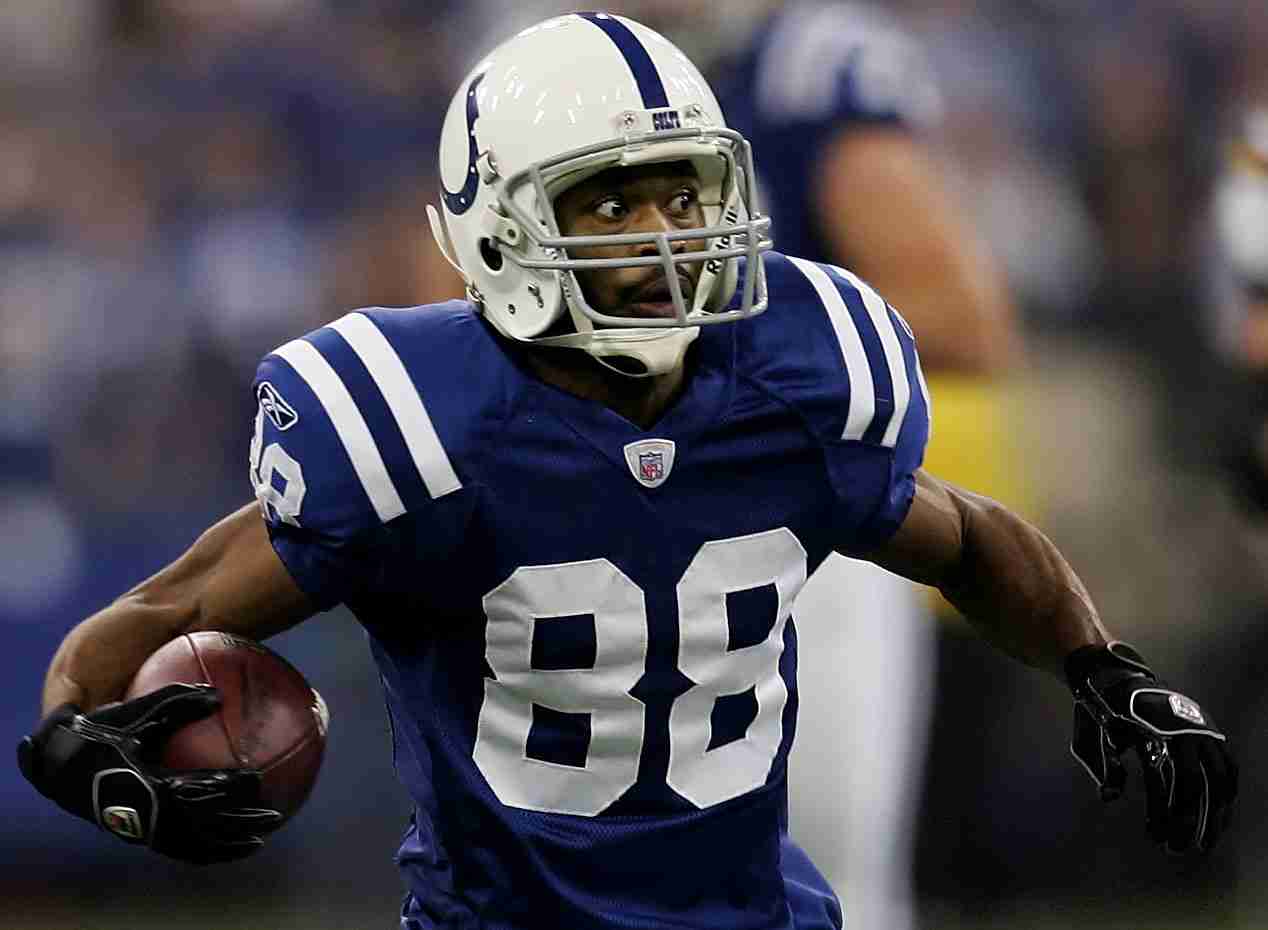
Having a lot of fun doing our Baseball debates with two of my bloggers, DDT and the Phillies Archivist, I wanted to repeat the same idea with this year’s Football Finalists, but due to time constraints I will take a deeper look at each candidate myself and offer a few thoughts as to their Hall of Fame candidacy
Next, I take a look at former Wide Receiver, Marvin Harrison.
The biggest shock last year was that Marvin Harrison did not get in last year on his first year of eligibility, as stat wise he was the most accomplished of the Wide Receivers on the ballot. Harrison caught 1,102 passes for 14,580 Yards and 128 Touchdowns, career numbers that fit the resume of a Hall of Fame caliber player, even in this inflated era. He would twice lead the NFL in Receiving Yards, would three times be named a First Team All Pro three times and also was once named the NFL Alumni Wide Receiver of the Year.
Those accolades show that not only did Marvin Harrison have the durability, he had a claim at one point as the top Wide Receiver in the game, a “two for two” in what should make a player a Hall of Fame lock.
So what kept him out last year?
Harrison has had shooting incidents, a couple of which attached to drugs and drug dealers. Now, it needs to be stated that Marvin Harrison was never convicted on any charge, but it is a stigma that has followed him, as has the fact that he was not always the most cooperative with the media.
Still, as stated many times in this site, character should not be a factor (unless there is something far more serious) should not keep a man out of the Hall of Fame, and Harrison has every necessary gridiron credential.
My prediction is that the former Indianapolis Colt gets in this year, and he really should not have to wait another year. It’s already been too long.
Charles Haley: 2015 HOF Finalist
Jan 20, 2015
Written by
Committee Chairman
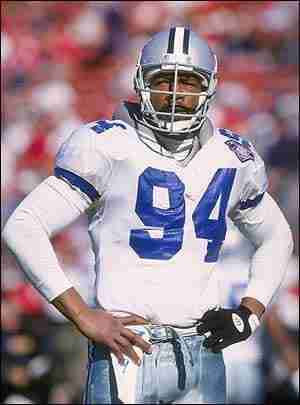
Having a lot of fun doing our Baseball debates with two of my bloggers, DDT and the Phillies Archivist, I wanted to repeat the same idea with this year’s Football Finalists, but due to time constraints I will take a deeper look at each candidate myself and offer a few thoughts as to their Hall of Fame candidacy
Next, I take a look at former Defensive End and Linebacker, Charles Haley.
This is the sixth consecutive year that Charles Haley has been named a Hall of Fame Finalist, and every single time that someone extolls the virtues of Haley for enshrinement they point to the same thing every single time:
Five Super Bowl Rings.
And why shouldn’t they do mention that fact over and over again? There is no player who ever competed in the National Football League who can make that claim, and why else do you play the game if it isn’t to become a champion? Haley wasn’t just a bystander, he was a pivotal figure in these championship teams with both the Dallas Cowboys and San Francisco 49ers and is one of the few players who has over 100 Quarterback Sacks (100.5). That is the most important stat, and one you can’t not mention when looking at Haley’s Hall of Fame credentials.
Haley was also someone who had successful seasons at both Defensive End and at Linebacker, and went to the Pro Bowl and had First Team All Pro Selections at both positions, overall accumulating two First Team nods and five Pro Bowl selections, which again are decent numbers, though we have seen many other defensive players with five Pro Bowls who really have not come close to getting into Canton, though that is not what many think has kept him out so far.
As much as you would hear John Madden wax poetic about his skills on Sundays, you would equally hear about character issues that Haley had. The defensive standout, who would later be diagnosed as bipolar, was absolutely detested by the media and though that should not be a factor for Hall of Fame voting, it is voted on by humans who mostly have interacted with the people they vote on. The human factor plays a part, right or wrong.
It is not that he also did not ruffle teammates the wrong way as he famously had to be restrained from attacking Quarterback, Steve Young following a loss to the Oakland Raiders and this was not an isolated incident.
Still, there have been many past teammates, namely Troy Aikman and his former coach, Jimmy Johnson who have been vocal advocates of Haley getting into the Hall. That kind of support has to help though as much as he has become a finalist over and over, there never seemed to be any year where it felt that he was going to get over that hump.
This year doesn’t feel that much different either and it wouldn’t surprise me to see him fall short again.
Kevin Greene: 2015 HOF Finalist
Jan 18, 2015
Written by
Committee Chairman
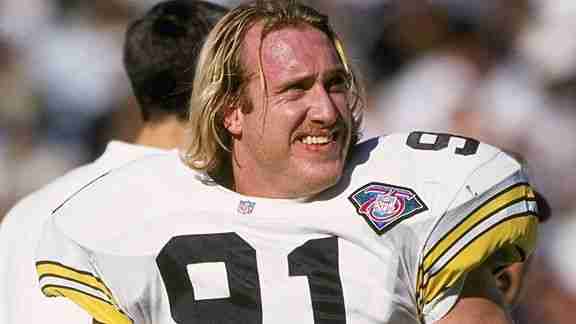
Having a lot of fun doing our Baseball debates with two of my bloggers, DDT and the Phillies Archivist, I wanted to repeat the same idea with this year’s Football Finalists, but due to time constraints I will take a deeper look at each candidate myself and offer a few thoughts as to their Hall of Fame candidacy
Next, I take a look at former Linebacker, Kevin Greene.
The Quarterback Sack is the sexiest defensive statistic in Football, and though the Interception is a far bigger game changer, the Sack defines the game. Despite the changing of the rules designed to protect the Quarterback, it remains an exciting play and the most coveting thing a Linebacker can get.
Kevin Greene recorded 160 of them.
Although the sack statistic is certainly aided by schemes and surrounding personnel, it is an impressive accomplishment and one that places him third overall behind Bruce Smith and Reggie White, both of whom were inducted into the Hall of Fame. Greene is also a two time leader in that category leading the National Football League in that stat in 1996 and 1998, the latter of which when he was 34 years old.
This bears mentioning, as though he was recording multiple sacks in his 20’s, he was a more complete player in his 30’s and it was this decade of his life where he was also recognized as one of the top defensive players of his time. Greene would be named the NEA Defensive Player of the Year in 1996, and would also be named the NFL Alumni Linebacker of the Year.
Greene would also be named to five Pro Bowls, two First Team All Pro nods and was also named to the 1990’s All Decade team, decent numbers and though many other Defensive players have been named to more Pro Bowls and All Pro squads, he wasn’t that far off from consideration in his early years.
Entering his fourth consecutive year as a Finalist, Kevin Greene again is not the highest profile Linebacker left and could easily be pushed aside for Junior Seau, and frankly if it comes down to picking only one Linebacker, it should be Seau, though Greene remains the top pass rusher on the ballot, a fact aided by Michael Strahan’s induction last year.
That is another factor that works against him, as he doesn’t have the same star quotient those other defensive players who got in recently, namely Strahan and Warren Sapp who got in the year before.
That shouldn’t matter, but though he did become a more balanced player later in his career, he is measuring up against others that were.
Kevin Greene should eventually get into the Hall of Fame, and probably should. Personally, the more I look at his career, the more I am swaying towards inducting him, as originally, I felt he was a bit too one dimensional. I will revert back to the word “eventually” because I don’t think he is getting in this year, but he won’t have to wait much longer.
Tim Brown: 2015 HOF Finalist
Jan 17, 2015
Written by
Committee Chairman
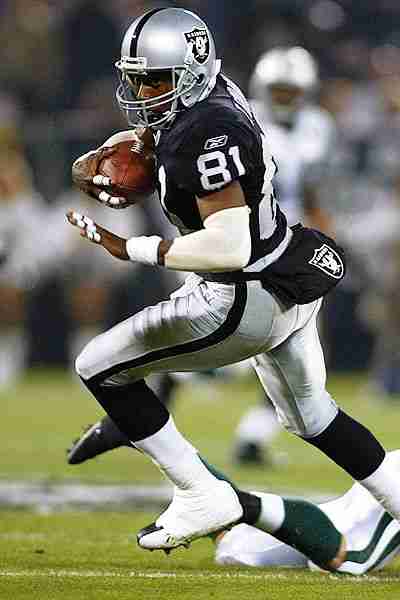
Having a lot of fun doing our Baseball debates with two of my bloggers, DDT and the Phillies Archivist, I wanted to repeat the same idea with this year’s Football Finalists, but due to time constraints I will take a deeper look at each candidate myself and offer a few thoughts as to their Hall of Fame candidacy
Next, I take a look at former Wide Receiver/Returner, Tim Brown.
Tim Brown first became eligible for the Football Hall of Fame in 2010, and was named a Finalist that year, and has been every year since. Brown has some substantial Hall of Fame credentials but has been caught in a logjam of more deserving Wide Receivers namely Cris Carter and Andre Reed who had a bit of a wait themselves.
Again, Brown is not the highest regarded Wide Receiver who made the Finals as Marvin Harrison, who personally I was shocked when he was not a first ballot inductee last year, did not get in. Last year, when the Hall of Fame reduced from fifteen to ten names, Harrison made the final ten, and Brown did not, indicating that he is still not on the top of the wideout pecking order.
This is not to say that he is not a Hall of Famer caliber player, because he does have a lot on his resume. What he lacks in First Team All Pro Selections (he has none) and Super Bowl Rings, he makes up for in Pro Bowl selections (nine) and Special Teams credentials.
Brown’s first Pro Bowl was as a Special Team selection and in that rookie campaign he would lead the NFL in Kick Return Yards. He would later lead the NFL in Punt Return Yards in 1994 and overall would contribute a total of 4,555 Return Yards and 4 Touchdowns; a mark that no other Wide Receiver can state.
Does that matter?
It should, but as we know, the Pro Football Hall of Fame never has put a lot of premium on Special Teams players, so why should we expect that they will care about a Special Team “add on” to a Wide Receiver career?
Perhaps that is the problem, as Tim Brown’s Wide Receiving was decent, he was never ever considered among the top two in his position, and if he ever was at any given time, he could at least cling to that.
That does matter, as being considered an elite performer at an offensive skill position he would probably be indicted already. Just one season, in addition to his career statistical accomplishments would have made him impossible to overlook by this point.
Even with the inflated statistics that exist within Wide Receivers at this time, Tim Brown is still in the top five in Receptions and Receiving Yards and while he was able to successfully to climb the all time stat ladder, he still did so in an era where he had a lot of competition.
With his additional dimensions on Special Teams and his accumulated totals on Offense, he would receive my vote, and has waited long enough.
Saying that, I don’t think he will get the call this year either.
Don Coryell: 2015 HOF Finalist
Jan 17, 2015
Written by
Committee Chairman
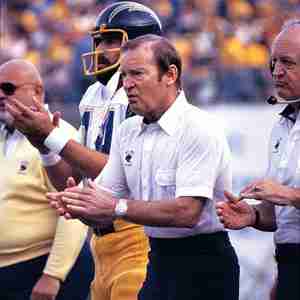
Having a lot of fun doing our Baseball debates with two of my bloggers, DDT and the Phillies Archivist, I wanted to repeat the same idea with this year’s Football Finalists, but due to time constraints I will take a deeper look at each candidate myself and offer a few thoughts as to their Hall of Fame candidacy
Next, I take a look at former Head Coach, Don Coryell.
This is actually the easiest debate as the Hall of Fame case for Don Coryell always comes down to the same question: Innovation Vs Success.
Seriously, it is that simple.
Coryell was dubbed “Air Coryell” for a putting a higher premium on the passing game, and creating a unique rhythm forcing defenses to cover all parts of the field. Tight Ends, Running Backs would go in motion, Receivers had no set start point, and the ball would be going to the target before the receiver would get there. Coryell made deep routes a major part of his offense and altered the way Tight Ends were played, making them a bigger part of offensive targets. All of this is commonplace today but this was not happening before Coryell literally changed the way the game was played.
He would begin this revolution with the St. Louis Cardinals where he would win two consecutive division titles, but it was in San Diego where he had the Quarterback he wanted (Dan Fouts) that he was really able to bring his vision to light. His Chargers would win the division three times and would lead the National Football League in passing six consecutive seasons, which remains a record today.
That’s the positive side of the Hall of Fame ledger, which has been enough to keep him on the ballot for a few years now; here is the negative.
Coryell did take his teams to the playoffs often but only has a 3 and 6 record and does not have any Super Bowl rings, generally a prerequisite for a Hall of Fame induction. His regular season record is 111-83-1, which is decent, but is not spectacular.
However, the biggest and fairest criticism of Don Coryell was his lack of attention to defense, and even past Defensive Coordinators would state that he had limited interest in that side of the ball. That did show in the teams he coached, as they were routinely on the bottom half of points and yards allowed.
So there you have it. The ultimate case of innovation Vs Accomplishment.
Personally, I am all about innovation, though my glasses are tainted somewhat by looking at other Halls of Fame and how they induct players/musicians and when you are a game changer, I believe you should get in.
Will he this year?
Probably not.
Morten Andersen: 2015 HOF Finalist
Jan 15, 2015
Written by
Committee Chairman
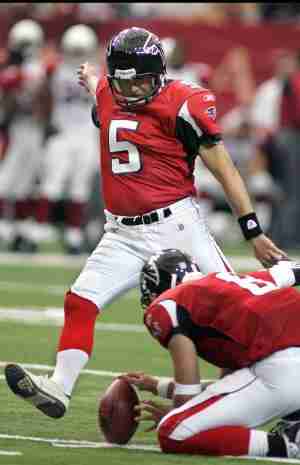
Having a lot of fun doing our Baseball debates with two of my bloggers, DDT and the Phillies Archivist, I wanted to repeat the same idea with this year’s Football Finalists, but due to time constraints I will take a deeper look at each candidate myself and offer a few thoughts as to their Hall of Fame candidacy
Next, I take a look at former Place Kicker, Morten Andersen.
I have to admit I was surprised that Morten Andersen was a Hall of Fame Finalist last year. It isn’t that there are not some serious Canton worthy credentials, he does, but since it’s inception the frequency in which they have elected Special Teams players has not exactly been regular.
Punter, Ray Guy had a long wait to get into the Hall, and had to wait until he was a Senior Nominee before he finally got the Hall; this despite being regarded by every football pundit as the greatest Punter in the history of the game. It has been a little easier for Place Kickers…but not much.
There are players in the Pro Football Hall of Fame who have a significant amount of PATs and Field Goals made but these were players (George Blanda for example) that had a significant amount of playing time at other positions. The only full time Kicker in Canton is Norwegian born, Jan Stenerud, so would not seem somewhat fitting that a fellow Scandinavian (Andersen was born in Denmark) join him?
Andersen is currently the all-time leading scorer in NFL history and is 398 Points ahead of the 42 year old Adam Vinatieri, and if he can’t catch him, he will hold that record for a considerable amount of time. Normally, the leading scorer in any sport would be a lock for a Hall of Fame, but American Football doesn’t work that way, so that by no means makes him a lock.
The “Great Dane” also is the all-time leader in Games Played, and consecutive Games Played and Field Goals Made and is also the all-time leader for both the New Orleans Saints and the Atlanta Falcons. In addition, Andersen went to seven Pro Bowls and made three First Team All Pro squads.
Adam Vinatieri had that signature moment when he kicked a forty-five yard Field Goal in the snow to tie a 2002 playoff game against the Oakland Raiders (the infamous “Tuck Rule” Game) and a much shorter one to win the game. Vinatieri would also kick the game winning in that year’s Super Bowl, and instantly he became the most famous Place Kicker in the NFL and actually received endorsements, unheard for a Kicker.
Andersen himself had a signature playoff moment while playing for the Atlanta Falcons when his 38 Yard overtime Field Goal in 1999 took Atlanta to the Super Bowl, though unlike Vinatieri, his team was not able to capitalize on the big one.
Should the fact that Morten Andersen never won a Super Bowl keep him out of the Hall of Fame? Not at all, Andersen did what was required of him in clutch situations, which is all you can ask of your clutch kicker, but it does make Vinatieri a sexier candidate, and if Andersen is still lingering on the ballot, he could be overlapped.
Saying that I don’t think that Andersen will still be there, but I don’t think that he is getting in this year, though I do predict he will eventually be the second pure Place Kicker in the Pro Football Hall of Fame.
Orlando Pace: 2015 HOF Finalist
Jan 13, 2015
Written by
Committee Chairman
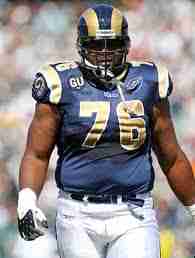
Having a lot of fun doing our Baseball debates with two of my bloggers, DDT and the Phillies Archivist, I wanted to repeat the same idea with this year’s Football Finalists, but due to time constraints I will take a deeper look at each candidate myself and offer a few thoughts as to their Hall of Fame candidacy
First up, I take a look at former Offensive Tackle, Orlando Pace.
You had to know that the St. Louis Rams “Greatest Show on Turf” team was going to have multiple names make this year’s finalists. Along with Kurt Warner, Isaac Bruce and Torry Holt, Pace was one of four members of the Super Bowl XXXIV Championship team that became eligible all in the same year. Personally, I thought that either Bruce or Holt would join Warner and Pace, but perhaps those deciding the fate of the Finalists thought that two Rams were sufficient or maybe Bruce and Holt cancelled each other out.
That aside, when you talk about those great Rams teams, the names of Warner, Marshall Faulk, Bruce and Holt received the press, as you would expect; skill positions always do, but would St. Louis have been as good without Orlando Pace helming the Offensive Line?
Protecting Warner and opening up gaping holes for Faulk, Pace gave the Rams exactly what they hoped for when they selected him first overall from Ohio State in 1997. In the twelve years that he played for the Rams, they had more gross yards than any other team in the National Football League and he blocked for three consecutive MVPs (Warner twice and Faulk once).
Legacy wise, Orlando Pace is regarded as one of the three Left Tackles of his era who were considered among the elite; the others being Walter Jones and Jonathan Ogden, both of whom just entered the Hall of Fame, leading to a lot of reason to think that Pace should be able to follow them both into Canton.
Trophy wise, Pace has what you want for a Hall of Fame candidate. His resume brings three First Team All Pro Selections, seven Pro Bowls, a selection to the NFL All Decade Team (2000’s), the 2008 Ed Block Courage Award and of course that Super Bowl Ring.
So what works against him?
Well much like Harrison and Holt may have had a cancelling of each other out, it is possible that the same could happen for Pace and Warner, or that the committee may wish to only one put St. Louis Ram in. There is no urgency to induct either one of them, and with all due respect to Warner and Pace, there will not be that large of an uproar if either of them do not get in on the first ballot.
What also may play against him is Will Shields, who although played on a different position on the Offensive Line (Right Guard), but nevertheless there is an O-Lineman, and with limited spots available, Shields, who has been a Finalist already for the past three years might get the nod. Also, Senior Candidate, Mick Tingelhoff, is a Center, and Senior Candidates have had a better than 60 percent chance once they make this round.
So would I cast a vote for Orlando Pace? Yes, and I do think there is a very good chance that he will get in on his first try, but if he fails I don’t see him waiting a very long time. I will go on record that I would prefer for him to be first Ram Super Bowl winner over Warner and for the sake of what might be a perceived St. Louis log jam (never underestimate how voters think about things like that), I sincerely hope one of them does, to ease a path for Holt or Bruce, both of which who are deserving of at least an extended look as a Finalist.
Saying that, I have a sneaky feeling that Warner will get the spot over Pace, and Shields might slide ahead. My official prediction is that the very deserving and Hall worthy Orlando Pace will enter Canton…but on the second try.
The Larry Walker Debate: 2015
Dec 31, 2014
Written by
Committee Chairman
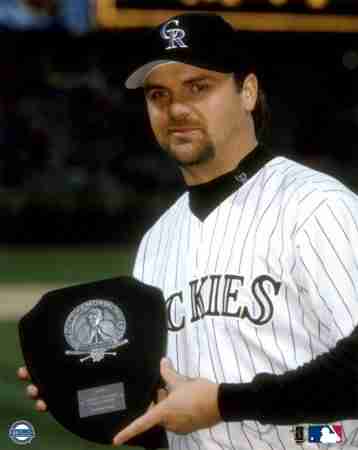
This is the twenty-fourth and final of our series where we here at Notinhalloffame.com, do what else? Debate the merit of twenty-four men on the most loaded Baseball Hall of Fame ballot in our lifetime.
Joining me, the site's Committee Chairman, in this debate are D.K. of the site's Phillies Archivist blog and Darryl Tahirali of the site's DDT's Pop Flies blog. This looks to be a very important part of our site, and we hope you will enjoy reading this as much as we enjoyed writing it.
Chairman: Every single time the Baseball Hall of Fame and Larry Walker are in the same sentence together, most bloggers, writers, pundits and fans counter with two words: Coors Field. While I think there is some legitimacy to that argument, this is a guy who still put up good numbers in Montreal, had good numbers on he road while with Colorado, and by the way these are the same guys (the writers) who talked about the Coors effect and voted him the MVP of the National League in 1997. Walker is on the 5th ballot, and last year he had his lowest total yet with 10.2%. On the surface, this is not a path to Cooperstown.
D.K.: Walker was a .320 career hitter until late in his career. If he had played one more season instead of retiring at age 37 he would have reached the 400 HR plateau. (Like Mussina, he apparently wasn’t interested in establishing a statistical legacy). Walker had some years where his batting average, on base percentage and slugging percentage, plus those two last categories combined were absolutely Crazy Good! However, the voting writers choose to look on this as just an aberration of having Coors Field as his home park.
I think the writers should re-examine Walker’s career rather than just dismissing his numbers as being, the product of having a great park to hit in.
Walker’s inability to attract votes also looms like an ominous dark cloud over the future candidacy of the greatest Colorado Rockie of them all, Todd Helton!
Darryl: I've been writing about Larry Walker since my first article for this site, and in my 2013 ballot evaluation I went into detail about Walker and the "Coors Effect." First, Walker played less than 30 percent of all his games at Coors, and his last two seasons of his nine total were after the Colorado Rockies began storing baseballs in a humidor to neutralize the park's altitude effects. Prior to coming to Colorado, Walker played five full seasons in Montreal's Olympic Stadium, and in three of those seasons the stadium was considered to be a pitchers' park. When Walker won the NL MVP in 1997, he posted a .346/.443/.733 slash line on the road, and he actually slugged better on the road—his home slugging percentage was .709 while he slugged .733 on the road—and he hit 29 of his 49 home runs that year in ballparks other than Coors Field. In short, Larry Walker could hit anywhere, he was a five-tool player, and he ranks 10th all-time among all right fielders according to Jay Jaffe's JAWS system. The nine ahead of him are all Hall of Famers while Walker is ahead of Hall of Famers Paul Waner, Sam Crawford, Tony Gwynn, Dave Winfield . . . Every year I repeat myself on this. Not that it will help Walker. The writers won't elect him.
Chairman: We are all on the same page, beating that dead horse. Walker could conceivably fall off the ballot this year and hardly anyone would care. The numbers bear everything out, the Coors advantage was proven statistically not to be as big an impact on his overall career as people think, but again the writer’s just don’t care, and the ones that do don’t seem to have any impact. He is going to stay on the ballot just so that we have this same discussion every year.
D.K: Walker was indeed a 5-tool player as Darryl attests. He could field and had an excellent throwing arm to cut down runners or to make them not even think about trying to stretch those singles into doubles.
The advanced statistics systems that have come into vogue recently bear out what I had always felt in my gut - that Walker could hit no matter where he played or how challenging a park’s dimensions might be.
Here’s hoping he gets a larger share of votes this year. Up to this point he has been about the most underrated and underappreciated candidates in recent writers’ ballots history.
Darryl: I think Larry Walker is a bellwether for players whose home park was Coors Field, and his fate will have an impact on Todd Helton when he becomes eligible, although Helton played his entire career in Colorado and Walker did not. The larger issue is with the Hall having to come to terms with this condition, as it has had to do so with the designated hitter and relief pitching, but, really, park effects should not be an issue for the Hall. Hall of Famer Chuck Klein raked like a monster in his home park, Philadelphia's Baker Bowl, but was an average hitter elsewhere. Walker was excellent anywhere. And while this closing remark comes from the emotional side, as a Canadian, albeit one long-transplanted to the States, I want to see a guy from British Columbia in the Hall of Fame!
Chairman: It breaks my heart on a fictional vote to say no (he is my 11B) so I can only imagine how awful I would feel if I had a real ballot; and yes it hurts me more as a Canadian!
D.K.: Walker ranked tied with Jeff Kent for 11th - meaning those two are near-misses under the current system. - NO. These two get my vote if the writers had been successful in getting the rules changed to allow a maximum of 12 votes per writer instead of 10.
Darryl: This is one of my protest votes, along with those for Barry Bonds and Roger Clemens, although in Larry Walker's case it was one of his home parks that was on steroids for a while, not he himself. I've been saying this for years: He is an effing Hall of Famer. My tenth and final Yes vote.
The Alan Trammell Debate: 2015
Dec 30, 2014
Written by
Committee Chairman
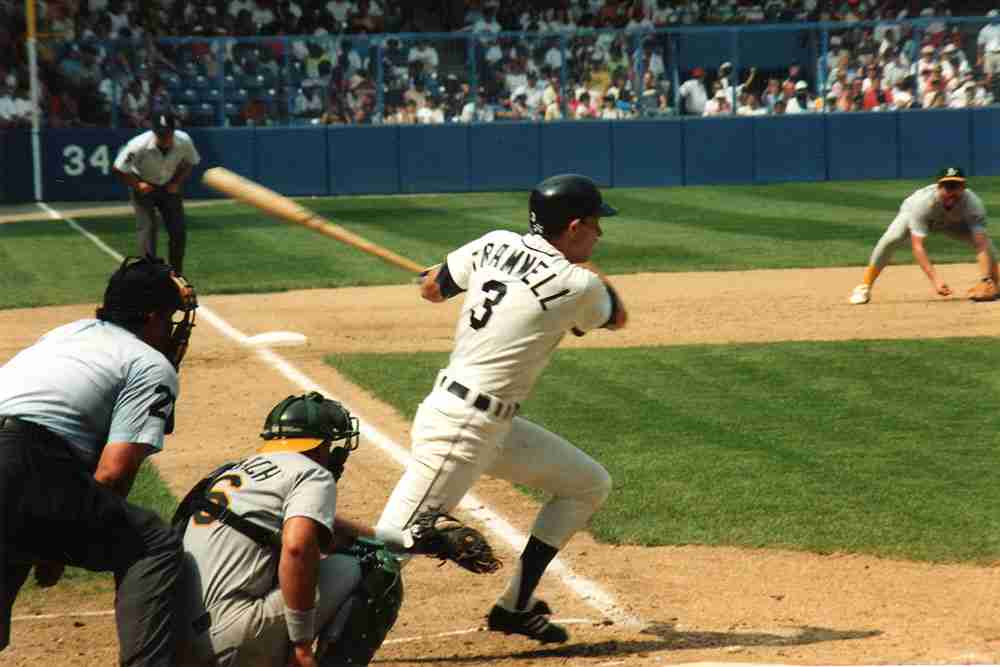
This is the twenty-third of our series where we here at Notinhalloffame.com, do what else? Debate the merit of twenty-four men on the most loaded Baseball Hall of Fame ballot in our lifetime.
Joining me, the site's Committee Chairman, in this debate are D.K. of the site's Phillies Archivist blog and Darryl Tahirali of the site's DDT's Pop Flies blog. This looks to be a very important part of our site, and we hope you will enjoy reading this as much as we enjoyed writing it.
Chairman: Alan Trammellis here on his fourteenth ballot, and based on the voting we have seen thus far, he will be on the ballot next year, fail, and have to look for a Veteran’s Committee induction. Trammell’s high water mark for voting was 36.8% two years ago and dropped back to 20.8% last year. I think we can all we agree that he is not getting in this year. What I want to ask both of you is should he.
D.K.: Alan Trammell is someone who has never really captured my imagination as being a potential Hall Of Famer. When he came up to the Tigers in 1977 (cup of coffee) & 1978 (first full season). I think his fielding skills were a little raw, but he worked on that aspect of the game and by the early or mid-1980s he was as smooth at that position as any active MLB shortstop. He would wind up winning four Gold Gloves.
While he’s not a favorite of mine I’d have to say that he has better stats than a lot of HOF middle infielders. With over 2,300 hits, a career batting average of .285 that includes seven .300 seasons, 1003 RBI, and 185 home runs, he probably ranks somewhere in the middle of the pack among shortstops who are currently in the Hall of Fame.
Darryl: Actually, DK, according to Jay Jaffe's WAR Score system (JAWS), Alan Trammell ranks 11th all-time among all shortstops and 8th all-time among the 21 shortstops already in the Hall of Fame; he is even ranked just ahead of Derek Jeter by JAWS although Jeter's total WAR value is about one and half wins better than Trammell's. None of which matters because the writers are not going to elect Trammell this year or next year, which will be his final year, and his fate is in the hands of a future Expansion Era Committee. So, Chairman, to answer your question: Yes, Alan Trammell is a Hall of Fame shortstop. He is better than shortstops Joe Tinker, Dave Bancroft, Hughie Jennings, Travis Jackson, Phil Rizzuto, and Rabbit Maranville, all of whom are already in the Hall of Fame.
Chairman: My thinking is more with Darryl on this one. I always thought he was one of the better Shortstops of all time, and maybe there is a bit of bias because when I first really to understand baseball, I was twelve years old and that was that dominant team Tigers team that won the World Series in 1984. Take Cal Ripken out of the picture (or let’s say he played third), Trammell adds a few All Star Games, and he might already be in as the consensus top Shortstop in the AL over that time period. Hell, we might be arguing Tony Fernandez instead!
I’ll say this, which is completely irrelevant. Somewhere around that time Trammell and Lou Whitaker also appeared on Magnum P.I., which also adds to the pop culture love for me…and yes that stuff matters far more to me than it should be.
Randomness aside, it looks like the Veteran Committee will have Trammell (and perhaps Lou Whitaker) on future ballot, and maybe he will get a shot then, because it won’t happen here.
D.K.: Alan Trammel’s candidacy evokes the question: Is there one Hall of Fame offensive standard for all players, or should voters follow separate standards for each position. Going by the former standard Trammel wouldn’t have much of a shot, but he becomes a valid, even a strong candidate if you judge him simply by how he’s performed compared to other shortstops. Defensively his reputation is solid and he’s bagged a quarry of Gold Glove Awards, but let’s examine his results as a hitter.
Trammel hit a solid .285 lifetime and enjoyed seven .300 seasons. He’d hit 12 to 15 home runs typically in his peak years, but reached 20 home runs twice, including a career high 28 one year. His final career total was 185 home runs. He’d drive in 60 to 75 runs just about every year in an eleven year peak period of 1980 to 1990. He finished with 1,003 ribbys.
He’d average better than a hit per game over his 20 year career that ended in 1996, with 2365 hits in 2293 games.
He had one off the charts season in 1987 where he and Darrell Evans led the Tigers to an A.L. East championship. Trammel’s numbers that year were 28 home runs, 105 RBI this only 100 RBI season) and a .343 batting average - all career bests! He wasn’t able to maintain that pace, but he did add three more .300 seasons after ‘87.
In a typical election year Trammel probably gets my vote, because his numbers are better than most HOF shortstops. This year however, is anything but typical and I can see four or five candidates being elected come January 6. It’s an awfully strong field and Trammel probably won’t make it into most writers’ top ten - the maximum number of candidates each writer can vote for. He falls short of my top ten as well. That doesn’t mean that I don’t support his HOF candidacy in the long run, however.
If the logjam of candidates is eased by the election of a number of players this year then Trammel will have my vote in the 2016 election, his final year on the writers ballot. My guess is that Trammel will make it to the Hall of Fame by way of the Veterans Committee in the not-too-distant future.
Darryl: D.K., I would hope that voters are considering positional scarcity in their selections, and I think that they have been, even historically. Ray Schalk, albeit a veterans committee selection in 1955, was voted in based overwhelmingly on his defensive play as a catcher. (Schalk has the dubious distinction of having an on-base percentage higher than his slugging percentage, .340 to .316, and although I'm too lazy to look it up, I suspect that Schalk's 11 home runs are the fewest hit by a position player in the Hall of Fame. But I digress. More relevant to our discussion here, shortstops Rabbit
Maranville and Ozzie Smith were both voted in by the writers, and both are much better known for their defensive abilities rather than their offensive ones; their respective elections may indicate the evolution of thinking: Maranville was elected on his final ballot in 1954 while Ozzie was a first-ballot inductee in 2002. I swear I've read somewhere recently that if Alan Trammell could have done backflips, he'd already be in the Hall. So, I'm saying it again.
As for Lou Whitaker, I noted his unfair one-and-done in my very first column for the site. He and Bobby Grich are two second basemen who deserve a strong second look. And if there is any justice in a future Expansion Era Committee, both Trammell and Whitaker will be elected in the same year.
Chairman: I want to vote for Alan, but in this ballot I have to say no. I hope he gets a real fair look from the Veterans Committee.
D.K.: Tied for 15th with Don Mattingly - and like Mattingly his HOF fate will soon be decided by the Veterans Committee. For Trammel and Mattingly to be elected in the future it will take a more enlightened group of voters than the vets committee that just rejected Minoso, Hodges, Oliva, Kaat, Wills and Allen last week.
Darryl: No. Alan Trammell is a SABR darling who does not have the Hall of Fame aura. I think he belongs in the Hall, but this is triage time--we need to clear the ballot by electing viable candidates. I hate to put so callously, but you don't water a dying flower. Trammell's viability on this ballot is as healthy as an orchid in the middle of the Sahara. May the Expansion Era Committee who gets to vote him in do so swiftly and mercifully, but the writers ain't gonna do it. Damn.

